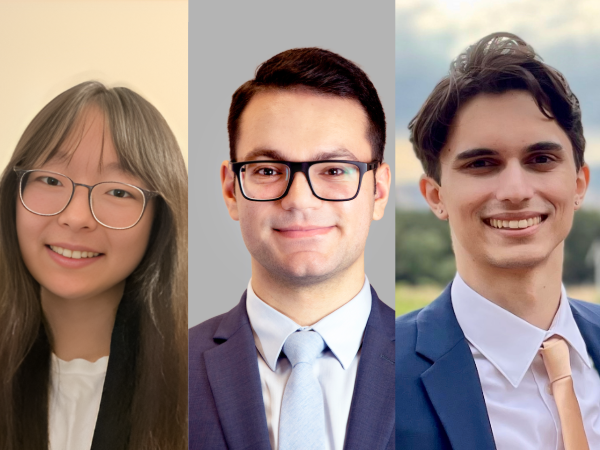 Three students from the UAB Heersink School of Medicine’s Medical Scientist Training Program (MSTP), housed within the Physician Scientist Development Office (PSDO), recently earned first place in an international hackathon hosted by the Mission: Brain Foundation. Hazel Cho, Abdulraheem Kaimari, and Riyaz Razi competed in the three-day virtual event, which brought together more than 80 teams from more than 40 countries to develop practical solutions to challenges in neurosurgical care. Their project stood out for its innovation, clarity, and teamwork.
Three students from the UAB Heersink School of Medicine’s Medical Scientist Training Program (MSTP), housed within the Physician Scientist Development Office (PSDO), recently earned first place in an international hackathon hosted by the Mission: Brain Foundation. Hazel Cho, Abdulraheem Kaimari, and Riyaz Razi competed in the three-day virtual event, which brought together more than 80 teams from more than 40 countries to develop practical solutions to challenges in neurosurgical care. Their project stood out for its innovation, clarity, and teamwork.
The Mission: Brain Foundation is a nonprofit that promotes neurosurgical education and patient care through service and collaboration. Co-founded by leading neurosurgeons, it engages professionals and students in hands-on initiatives—such as its annual hackathon—that encourage innovation, critical thinking, and professional growth in neurological care. Hackathon winners are selected by a panel of experts from neurosurgery, technology, and healthcare.
Participation in the hackathon was inspired by the team’s shared interest in neurological care and problem-solving in time-sensitive conditions like stroke. To prepare, they researched the realities of stroke treatment in rural settings, gathered background data, reviewed relevant biomarkers, and designed a step-by-step clinical workflow tailored to the needs of local healthcare workers.
The team’s winning project, NeuroBridge, addresses the challenge of stroke care in ultra-rural areas, where clinics often lack imaging, lab testing, and physician support. To help bridge this gap, the students developed a low-cost “Stroke Kit” designed for use by nurse-led clinics. It features a blood-based test using GFAP and D-dimer to distinguish between ischemic and hemorrhagic stroke, along with physical tools and protocols.
“All components are designed for use without electricity, advanced infrastructure, or digital connectivity, making it scalable and practical for low-resource clinics,” said Kaimari.
The team focused their solution on areas like rural Oaxaca, Mexico, where long travel times to hospitals and limited resources contribute to delays in care. By equipping local providers with simple, reliable tools, NeuroBridge enables faster diagnosis and more timely stroke treatment in ultra-rural communities.
“Winning was an incredible and unexpected experience,” said Razi. “It was extremely gratifying to see that professionals in the field of both neurosurgery and business thought this was a viable idea.”
For the team, the competition emphasized the importance of collaboration and practical problem-solving in medicine. It reinforced how effective tools must be both scientifically sound and tailored to real-world needs. Their success in the Mission: Brain Hackathon showcases the power of student-led innovation in shaping the future of healthcare.